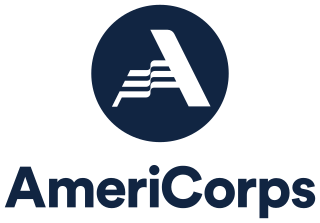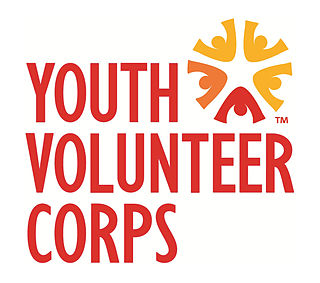Related Research Articles

National Civilian Community Corps (NCCC), or AmeriCorps NCCC is an AmeriCorps program that engages 18- to 24-year-olds in team-based national and community service in the United States. Under the CARES act, however, the maximum age of entry is 26. National Civilian Community Corps teams complete about four different six- to eight-week-long projects during their 10-month term of service. Each team is made up of eight to twelve Corps Members and one Team Leader. Corps Members and Team Leaders are representative of all colors, creeds, states, and economic status.

City Year is an American education nonprofit organization founded in 1988. The organization partners with public schools in 29 high-need communities across the US and through international affiliates in the UK and Johannesburg, South Africa. City Year teams are made up of 18 to 24 year olds, who provide student, classroom, and whole school support, intended to help students stay in school and on track to graduate high school. City Year is a member of the AmeriCorps national service network, and is supported by the Corporation for National and Community Service, school district partnerships, and private philanthropy from corporations, foundations and individuals.

AmeriCorps is an independent agency of the United States government that engages more than five million Americans in service through a variety of stipended volunteer work programs in many sectors. These programs include AmeriCorps VISTA, AmeriCorps NCCC, AmeriCorps State and National, AmeriCorps Seniors, the Volunteer Generation Fund, and other national service initiatives. The agency's mission is "to improve lives, strengthen communities, and foster civic engagement through service and volunteering." It was created by the National and Community Service Trust Act of 1993. In September 2020, the agency rebranded itself as AmeriCorps, although its official name is unchanged.
Founded in 1997 by AOL co-founder Steve Case and his wife Jean Case, the Case Foundation invests in individuals, nonprofits, and social enterprises aiming to connect people, increase giving, and catalyze civic action.
Citizen Corps is a program under the Department of Homeland Security that provides training for the population of the United States to assist in the recovery after a disaster or terrorist attack. Each local Citizen Corps Council partners with organizations, volunteers and businesses to organize responders, volunteers and professional first responders for an efficient response so efforts are not wasted by being duplicated. By training in Incident Command, volunteers know whom to report to and how the incident is organized. This prevents sites from being inundated by untrained and unprepared personnel preventing operation. Citizen Corps also works in conjunction with the Corporation for National and Community Service in promoting national service opportunities for promoting homeland security needs.

Notre Dame Mission Volunteers is a faith-based non-profit organization founded by the Sisters of Notre Dame de Namur in 1992. In 1995, NDMV sought a partnership with AmeriCorps to allow for an increase in the number of members, offering greater community service in financially limited sites. This partnership formed Notre Dame Mission Volunteers AmeriCorps. The program began with 46 service members placed in four communities: Baltimore, Boston, Cincinnati, and Apopka, Florida. Building on the initial success of these four sites, NDMVA has continued to systematically extend the range and depth of its AmeriCorps program. Notre Dame Mission Volunteers AmeriCorps members serve in seventeen sites across the United States. Notre Dame Mission Volunteers also has a separate international program in which members currently serve in four international sites in Brazil, Haiti, Nigeria, and Peru. Its National Office is currently based out of Baltimore, Maryland.
CaliforniaVolunteers is the state agency charged with increasing the number and impact of Californians engaged in service and volunteering.
Green Light New Orleans (GLNO) is a nonprofit organization based in New Orleans, Louisiana. The environmentally conscious organization works to reduce carbon emissions through the replacement of traditional, non-environmentally friendly bulbs with compact fluorescent lights (CFLs). Ultimately, the organization aims to remove all of the city's incandescent lights and replace them with CFL lights.
ServiceNation was a campaign of Be The Change, Inc., a 501(c)(3) organization based in Boston, Massachusetts. Its mission is to rekindle an ethic of civic responsibility in America through universal national service. ServiceNation's goal was to expand opportunities for Americans to spend a year in non-military national service such as AmeriCorps. National service programs like Americorps pay a living stipend and reward volunteers who have completed service with a monetary education award.
College Possible is a nonprofit AmeriCorps organization making college admission and success possible for low-income students in the United States through an intensive curriculum of coaching and support. Its model uses recent college graduates serving an AmeriCorps term of service as near-peer mentors for students lacking the social resources to successfully enroll in and graduate from college. Headquartered in Saint Paul, Minnesota, the organization serves students in all 50 states with offices located in the Minneapolis-Saint Paul metro area, Chicago, Milwaukee, Omaha, Portland, Philadelphia and Seattle.

The Edward M. Kennedy Serve America Act or Serve America Act was introduced in the United States House of Representatives on March 9, 2009, by Representative Carolyn McCarthy of New York. Originally titled the Generations Invigorating Volunteerism and Education Act, the bill reauthorizes and expands the AmeriCorps program that was first established in 1993. It passed in the House of Representatives on March 18, 2009. The U.S. Senate debated and approved an amended version of the bill on March 26, 2009, renaming it the Edward M. Kennedy Serve America Act, after Senator Ted Kennedy. The House of Representatives voted on the bill a second time, approving the amended version on March 31, 2009. It was signed by President Barack Obama on April 21, 2009.

AmeriCorps VISTA is a national service program designed to alleviate poverty. President John F. Kennedy originated the idea for VISTA, which was founded as Volunteers in Service to America in 1965, and incorporated into the AmeriCorps network of programs in 1993. VISTA is an acronym for Volunteers in Service to America.

Alan Khazei is an American social entrepreneur. He served as chief executive officer of City Year, an AmeriCorps national service program he co-founded with Michael Brown, his friend and roommate at Harvard College and Harvard Law School.
The AmeriCorps Education Award is granted to members who are serving, part-time or full-time, in participating programs through AmeriCorps. After completing a term of service, AmeriCorps members are eligible to receive the Segal AmeriCorps Education Award to pay education costs at qualified institutions of higher education, for educational training, or to repay qualified student loans. The current maximum award is $6,495.00 as of October 1, 2020.
SGSM Network, formerly known as The South Grand Senior Ministry, began in 2001 in partnership with some local South Saint Louis, Missouri Catholic parishes along the South Grand Avenue Corridor in St. Louis. SGSM started as a collaboration of only 2 churches, St. Stephen Protomarter and St. Cecilia, both located at the southernmost part of Grand Avenue. Though this organization started small, with church support and volunteers, the ministry was created to provide assistance and care to senior citizens throughout the Greater Saint Louis area.
Citizen Schools is an American nonprofit organization that partners with middle schools across the United States to expand the learning day for children in low-income communities. Its stated mission is "educating children and strengthening communities". Currently, Citizen Schools serves over 5,000 students and recruits over 4,280 volunteers over 31 program sites in 13 cities across 7 states. The center pieces of the Citizen Schools model are its apprenticeship programs run by volunteers that culminate in public demonstrations called WOW!s, and partnering with some middle schools to expand learning time for students. Citizen Schools offers the AmeriCorps National Teaching Fellowship providing a 2-year paid service opportunity for citizens interested in using their personal talents to enhance life opportunities for middle school students. Fellows in their second year can participate in a residency program operated by one of three university partners to obtain teacher certification in California, Massachusetts and New York. In honor of its 20 anniversary in 2015, Citizen Schools honored 20 alumni of the Fellowship who continue to make a profound impact in the community today.

Jesuit Volunteer Corps (JVC) Northwest connects people with one or more years of volunteer service that focus on JVC Northwest's values of community, spirituality/reflection, simple living, and social & ecological justice. JVC Northwest provides opportunities for individuals to reach out to persons living on the margins of society and vulnerable places throughout the Pacific Northwest. Jesuit Volunteers live together and serve with partner agencies in both rural and urban locales throughout Alaska, Idaho, Montana, Oregon and Washington.

Youth Volunteer Corps,(YVC), is a non-profit service organization operating throughout the United States and Canada that was created to introduce, encourage, and support the spirit of volunteerism in youth ages 11 to 18 through consistent, well-organized volunteer opportunities. It began in 1987 as a single organization in Kansas City, Missouri, sponsored by the Heart of America United Way and was funded by numerous public and private sources.
FoodCorps is an American non-profit organization whose mission is to work with communities to "connect kids to healthy food in school." FoodCorps places service members in limited-resource communities where they spend a year working with teachers and students to establish farm to school programs, incorporate nutrition education into school curricula, plant school gardens, and engage in other initiatives to improve school food. Like Teach for America and Habitat for Humanity, FoodCorps is a grantee of AmeriCorps.

College Access Now (CAN) is a non-profit organization based in Seattle. Its mission is to empower students from low-income families to access, enroll, and graduate from college at rates equal to their more advantaged peers. 94% of CAN's students are the first in their families to pursue a college degree.
References
- ↑ Post-Graduation Service Opportunities - Social Commitment | Grinnell College Archived 2011-06-13 at the Wayback Machine
- ↑ VOLUNTEER PROGRAM :: Red Cloud Indian School Archived 2011-02-15 at the Wayback Machine
- 1 2 About Post-Graduate Service: Center for Social Concerns Archived 2011-07-20 at the Wayback Machine
- 1 2 Post Graduate Volunteer Service Fair
- 1 2 Post-Graduate Volunteer Opportunities Archived 2010-11-29 at the Wayback Machine
- ↑ Post-graduate Service Opportunities Archived 2011-01-30 at the Wayback Machine
- 1 2 Volunteer Opportunities Listings – Boston College Archived 2011-03-20 at the Wayback Machine
- ↑ "Archived copy". Archived from the original on 2011-02-22. Retrieved 2011-02-10.
{{cite web}}: CS1 maint: archived copy as title (link) - ↑ Compensation – Teach For America
- ↑ Post-graduate Opportunities: Center for Social Concerns
- ↑ "NationalService.gov > Our History and Legislation". Archived from the original on 2007-10-17. Retrieved 2011-02-03.
- ↑ History | About Us | Peace Corps Archived 2011-01-22 at the Wayback Machine
- ↑ Maryknoll Lay Missioners – Who We Are
- ↑ AmeriCorps VISTA Handbook, Ch. 13, "Overview of roles of Americorps Vista Members - Chapter 13 - Americorps Vista". Archived from the original on 2010-07-14. Retrieved 2011-02-11.
- 1 2 Canisius College – Post Graduate Service Year
- ↑ Jesuit Volunteers
- ↑ Post-Graduate Volunteer Opportunities
- ↑ Catholic Volunteer Network Archived 2011-07-25 at the Wayback Machine
- ↑ Faith Works (newsletter of the Catholic Network of Volunteer Service), Winter 2007, "Archived copy" (PDF). Archived from the original (PDF) on 2011-07-25. Retrieved 2011-02-04.
{{cite web}}: CS1 maint: archived copy as title (link) - ↑ "Post-graduate Service' PowerPoint Presentation" by CNVS task force, "Archived copy". Archived from the original on 2011-07-20. Retrieved 2011-02-11.
{{cite web}}: CS1 maint: archived copy as title (link)